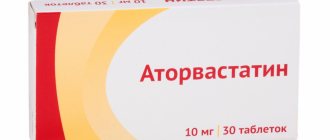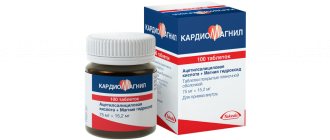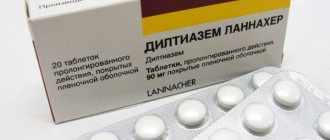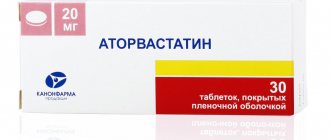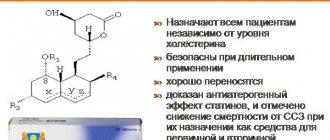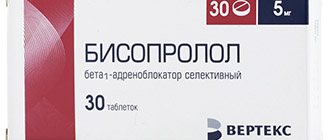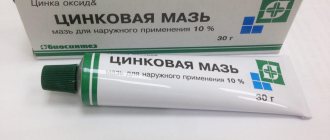Often, during routine examinations, people are diagnosed with high cholesterol. Not everyone thinks that if its amount exceeds the norm, then this is a direct threat to cardiovascular disorders. Doctors prescribe a special diet and a set of physical activities, but such measures do not always lead to good results. Then Atorvastatin comes to the rescue. Practice has proven that the medicine produces an excellent effect in combination with therapeutic nutrition.
Compound
| Film-coated tablets | 1 table |
| active substance: | |
| atorvastatin calcium trihydrate | 10.85 mg |
| 21.7 mg | |
| (equivalent to 10 and 20 mg atorvastatin, respectively) | |
| excipients: calcium carbonate - 33/66 mg; MCC - 48/96 mg; lactose monohydrate (milk sugar) - 23.85/47.7 mg; pregelatinized starch (starch 1500) - 32.8/65.6 mg; colloidal silicon dioxide (Aerosil) - 0.75/1.5 mg; magnesium stearate - 0.75/1.5 mg; polyvinyl alcohol - 2.5/5 mg; macrogol (polyethylene glycol) - 1.26/2.52 mg; talc - 0.93/1.86 mg; titanium dioxide - 1.56/3.12 mg |
Side effects
The unpleasant effects that arise from taking statins are ambiguous. In a study of healthy people taking atorvastatin, no side effects occurred. They manifest themselves in citizens at risk. Negative phenomena may be associated with the development of the disease and with the simultaneous use of other medications. The most common manifestations are:
- nausea;
- bronchitis;
- arthritis;
- infection of the genitourinary system.
Rarely, taking statins can provoke:
- diabetes;
- muscle pain;
- liver damage.
From the nervous system you can observe:
- headache;
- increased fatigue;
- dizziness;
- redness of the eyes;
- noise in ears;
- amnesia and other undesirable effects.
And:
- increased blood pressure;
- arrhythmia;
- angina pectoris;
- rhinitis;
- sinusitis;
- diarrhea;
- constipation;
- nausea;
- vomiting;
- manifestation of infections.
The problems end after stopping the drug.
Directions for use and doses
Inside.
Before prescribing Atorvastatin, the patient should be recommended a standard lipid-lowering diet, which he should continue to follow throughout the entire period of therapy.
The initial dose averages 10 mg/day. The dose varies from 10 to 80 mg/day.
The drug can be taken at any time of the day with food or regardless of meal time. The dose is adjusted based on baseline LDL/C cholesterol levels, goals of therapy, and individual response. At the beginning of treatment and/or during dose increases of Atorvastatin, plasma lipid levels should be monitored every 2–4 weeks and the dose adjusted accordingly.
Primary hypercholesterolemia and mixed hyperlipidemia, as well as Fredrickson types III and IV. In most cases, a dose of 10 mg of Atorvastatin once a day is sufficient. A significant therapeutic effect is observed after 2 weeks, and the maximum therapeutic effect is usually observed after 4 weeks. With long-term treatment, this effect persists.
Homozygous familial hypercholesterolemia. Prescribed at a dose of 80 mg (4 tablets of 20 mg each) 1 time per day.
Special patient groups
Renal dysfunction. The use of the drug in patients with renal failure and kidney disease does not affect the level of Atorvastatin in the blood plasma or the degree of reduction in cholesterol/LDL levels during its use, so a change in the dose of the drug is not required.
Liver dysfunction. In case of liver failure, the dose must be reduced.
Elderly patients. When using the drug in elderly patients, there were no differences in safety, effectiveness, or achievement of lipid-lowering therapy goals compared to the general population.
What does Atorvastatin help with?
Atorvastatin is a medicine that lowers blood cholesterol levels. The drug is often used for both primary and secondary prevention of cardiovascular complications. Atoris is exactly such a drug. The main active ingredient is atorvastatin. Like other statins, it suppresses the effect of an enzyme involved in the initial stage of cholesterol formation. Bad cholesterol forms atherosclerotic plaques on the walls of blood vessels, obstructing blood flow. The medicine stops cholesterol synthesis. Plaques do not grow, and atherosclerosis does not progress.
Taking this drug reduces the risk of a heart attack and prevents the development of angina pectoris. It is prescribed to patients with acute coronary syndrome. In people with ischemic stroke, Atorvastatin slightly reduces the risk of recurrence of cardiovascular changes.
pharmachologic effect
Atorvastatin tablets have hypocholesterolemic properties. The drug reduces the rate of production (completely inhibits the process) of the enzyme responsible for converting HMG-CoA into mevalonate, which is later converted into fats. The decrease in the level of lipoproteins and cholesterol in the blood plasma after the use of Atorvastatin is due to a decrease in the volume of cholesterol produced by liver cells and a decrease in the activity of HMG-CoA reductase.
Atorvastatin reduces the risk of ischemia and reduces mortality rates in patients of all age groups who have had myocardial infarction. During a course of treatment, the likelihood of developing fatal/non-fatal stroke, cardiovascular pathologies, and fatal lesions of the cardiovascular system decreases.
Overdose
Patients taking Atorvastatin must strictly adhere to the dosage recommended by their doctor. Otherwise, an overdose of the active ingredient cannot be ruled out. Against this background, the following side effects may develop: myalgia, fungal pathologies, increased fatigue, memory impairment.
In case of overdose, the patient is treated symptomatically; there is no specific antidote
Features of interaction with other medications
Atorvastatin SZ is not recommended for use simultaneously with Varvarin. A medicine intended to reduce cholesterol in the body interacts poorly with the following drugs:
- drugs with an antifungal effect;
- antibiotics from the macrolide group;
- drugs that have an immunosuppressive effect.
When using antacids intended to neutralize hydrochloric acid, the content of the active component of the drug in the plasma may decrease. If it is necessary to use such drugs simultaneously with Atorvastatin SZ, the decision to increase the dosage of the lipid-lowering drug should be made by the doctor.
Only a specialist should prescribe statins. Self-medication is dangerous for your health!
The shelf life of the medicine is three years. The medicine should be stored in a place protected from direct sunlight. The optimal temperature for storing the drug is 25 degrees.
Reviews
Reviews from cardiologists are numerous and generally positive. Specialists often prescribe the drug to their patients as a prophylactic agent. Atorvastatin prevents the development of complications from the cardiovascular system in patients with impaired cholesterol levels. Patient reviews are varied. There are both positive and negative responses.
Valentina Semyonovna, 65 years old: The doctor recommended taking Atorvastatin. I took the product for about three weeks. During this time, the size of cholesterol plaques decreased, the condition of blood vessels improved, and blood cholesterol returned to normal. The doctor said that the progression of atherosclerosis had stopped. And in order to consolidate the therapeutic effect, she prescribed another course of medication for preventive purposes.
Olga, 35 years old: I was diagnosed with high cholesterol. The doctor prescribed a course of Atorvastatin. But the product didn’t work for me. While taking it, nausea and heartburn appeared. I had to replace it.
Elena Valerievna, 45 years old: Atorvastatin was recommended to me by my attending physician as a replacement for Warfarin. I read a lot of negative comments about him. I was afraid there would be problems too. But I had nothing. But my cholesterol levels returned to normal. I took three two-week courses with a break of a month.
Expert advice
Atorvastatin is produced by many pharmaceutical companies, but not all of them show good results. Cheap analogues often have an annoying property - frequent side effects. It is difficult to understand the production technology of companies that are not drug developers. They sometimes carefully hide secrets.
Doctors recommend choosing only those medications that have positive results of therapeutic equivalence analysis. Atoris, for example, a studied analogue, is popular with doctors. “Faceless” tablets priced from 100 to 200 rubles should raise concerns: side effects can strike with enormous force, and the desired therapeutic result will never be achieved. When choosing a drug, it is better to trust your doctor. Most of them still want to cure the patient, and only they can know which medicine is suitable in a particular case.
How to enhance the effect of the medicine?
To enhance the therapeutic effect of the drug, it is recommended to adhere to a strict diet. Its main goal is to improve lipid metabolism.
If the level of cholesterol in the body is high, you need to limit the consumption of foods that contain animal fats. The diet includes dishes that saturate the body with fiber.
If you have high cholesterol, you should eat foods that contain large amounts of phytosterols. These include:
- sesame seeds;
- products containing wheat germ;
- sunflower seeds;
- flax seeds;
- olive oil;
- avocado;
- oil squeezed from grape seeds.
The diet should also include foods enriched with pectin: citrus fruits, apples, watermelons. If you have high cholesterol levels in your blood, the following foods are also helpful:
- spinach;
- green salad leaves;
- artichoke;
- sorrel;
- dill;
- parsley.
When using the drug Atorvastatin SZ, it is recommended to avoid eating pork, duck meat, offal, smoked meats, and sausages. Fatty fish, red caviar, shrimp, and canned fish are also prohibited.
It is recommended to exclude the following dishes from the diet:
- baked goods;
- mushroom broth;
- cream;
- high fat cottage cheese;
- sour cream;
- ice cream;
- chocolate products;
- palm oil products;
- mayonnaise;
- ketchup.
No ads 3
Contraindications
Atorvastatin should not be taken:
- people who have severe liver diseases - chronic hepatitis, liver failure, cirrhosis;
- women of reproductive age;
- children under 18 years of age.
The therapeutic effect after taking the medicine is not immediately noticeable. This drug prevents the formation of atherosclerotic formations, but does not resolve them. The body itself copes with the gradual removal of plaques. How quickly the process moves depends on the individual. Some will need more time, some less.
Do not stop taking the medication without consulting a doctor.
Who is Atorvastatin useful for?
Statins are indicated for people at risk. Healthy patients are not recommended to take them as prophylaxis. The issue has not been fully studied, and there are no effective clinical trial data. The drug is prescribed when diet, exercise, or other weight loss measures have not helped.
The main diseases for which atorvastatin is prescribed are:
- combined hyperlipidemia;
- primary or hereditary hypercholesterolemia;
- familial endogenous hypertriglyceridemia.
But the main purpose is cardiac ischemia (CHD).
In pregnant women, Atorvastatin crosses the placenta and reaches high concentrations in the fetal liver. It was not tested in humans, but in rats it was established that the survival rate of offspring was reduced. Among the surviving rodents, a decrease in body weight and developmental delays were noted.
If Atorvastatin is used simultaneously with antibiotics and clarithromycin, myopathy may progress, and the concentration of the substance in the blood plasma can increase by 40%.
Antacids - medicines used to treat the stomach - reduce the concentration of atorvastatin in the blood by 35%.

